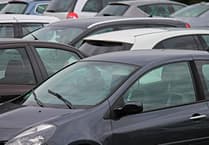Disabled taxi users in Monmouthshire won’t be able to take advantage of a new law aimed at giving them accessibility and fare parity with able-bodied passengers because the council haven’t made the right preparations, according to a disability activist’s research.
Monmouthshire are not among the seven councils in Wales who are expecting to meet the government-recommended October deadline to ensure equal treatment for disabled taxi users.
A change in the Equality Act enacted in April this year means that taxi drivers face a fine of up to £1,000 if they refuse to transport wheelchair users or attempt to charge them extra.
However, the law only applies to drivers registered on council lists of wheelchair accessible taxis, known as Section 167 lists. Only the councils for Carmarthenshire, Pembrokeshire, Powys and Rhondda Cynon Taf have already completed the lists, with a further three expecting to meet the deadline before October.
Monmouthshire join a list of councils that plan to produce a Section 167 list but have no specified deadline, others in this category are Bridgend, Cardiff, Neath Port Talbot, Newport and Wrexham.
A further nine councils in Wales, including Torfaen and Blaenau Gwent, allegedly have no plans to create a list or do not know if they will do so, leaving disabled passengers potentially facing overpriced rides and difficulty booking trips according to disability activist Doug Paulley.
Mr Paulley conducted Freedom of Information research with all councils in England, Scotland and Wales. Of them, only 11 per cent of councils have created a list, with a further 30 per cent intending to do so this year. That means 59 per cent have no firm plans to hit the deadline, including 26 per cent who have no plans to create a list at all.
Paulley and the charity, Muscular Dystrophy UK, which campaigns for disability rights, are calling on the government to make councils take their responsibilities seriously, and for all councils to set a deadline for creating a list.
Nic Bungay, director of campaigns, care and information at Muscular Dystrophy UK, said, ‘Taxis are not a luxury for disabled people, they often represent the only way to get from A to B when public transport isn’t accessible.
‘Doug’s research comprehensively demonstrates how many councils are failing to ensure that disabled passengers are not penalised. We need them all to implement lists now as per the government’s recommendations, and for the Department for Transport to promote the lists as a matter of urgency’.
Doug Paulley carried out the research following a Select Committee report into the Equality Act 2010 on disability. He says, ‘It is disappointing that the Government’s intent in bringing in this legislation is being undermined by the failure of many councils to undertake the required office work, meaning that taxi drivers can continue to discriminate against wheelchair users with impunity.
‘While conducting this research, it became clear that many councils simply didn’t think to create them until prompted. I recommend disabled people and their allies raise the issue with their local council’.
Research by Muscular Dystrophy UK in 2016 indicated that a quarter of disabled people have been refused service by a taxi driver, purely because they are disabled.




